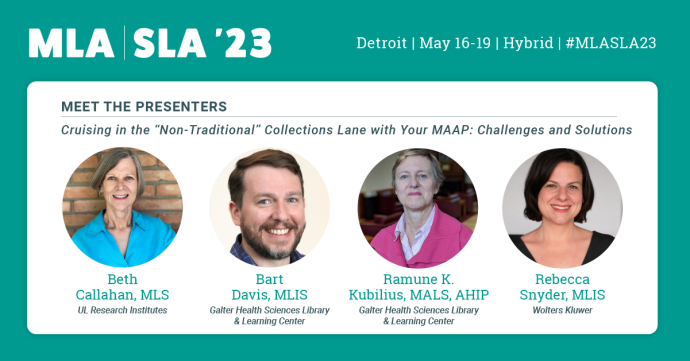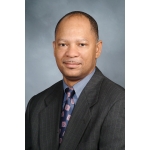Every week until MLA | SLA '23 in Detroit, we'll profile the experts leading each of the six Collection Development & Resource Sharing Symposium sessions by sharing their answers to questions about themselves and their session.
We continue the series with the presenters and moderator of Cruising in the "Non-Traditional" Collections Lane with Your MAAP: Challenges and Solutions: Beth Callahan (BC), Bart Davis (BD), Ramune Kubilius (RK), and Rebecca Snyder (RS). To learn about all the Symposium sessions and their presenters, please see the Symposium Session Schedule.
What are you most looking forward to seeing/eating/experiencing in Detroit?
BC: As a native Detroiter, I look forward to sharing a vibrant visitor experience and a fantastic conference with my colleagues!
BD: I'm looking forward to trying some Detroit-Style Pizza and a Coney Dog.
RK: Being a member of MLA and SLA, I’ll be interested in seeing them blend or showcase their unique conference traditions in one conference. Also, getting back to a conference in Detroit will be interesting, since it’s been a number of years.
RS: I haven’t visited Detroit since the 90’s. I’ve mapped out my dad’s family history sites and hope to visit them. There will also be art!
What’s a fun or surprising fact about non-traditional collections?
BC: As an observation, libraries have always successfully acquired and managed non-traditional collections. What’s new (and non-traditional) often quickly becomes traditional.
BD: Pretty much everything we think of as a traditional resource today would have once been considered a non-traditional resource.
RK: Paper or print, “genre” or “format,” problematic or challenging--I await what our session speakers and attendees will share about how they think about non-traditional collections.
RS: Some public libraries include bird-watching kits in their lending collections.
For librarians: What’s an interesting fact about libraries that publishers would be surprised by?
BD: You'd be surprised by the variety of interesting items in the Special Collections of various libraries. The only time I've held an Emmy Award was in a Special Collections vault.
RK: Libraries cannot be “put in a box.” As a publisher once said “if you’ve seen one library, you’ve seen one library.”
RS: Some public libraries include bird-watching kits in their lending collections.
How did you get started in libraries or publishing?
BC: I was a non-traditional student, and my day job was working in a hospital library as a technical assistant while I attended business school classes at night.
BD: Right after completing my undergraduate degree, I got a job as a library assistant at a liberal arts college and never looked back.
RK: Circuitously, through an allied health professional undergrad degree.
RS: I was the classroom aide in the middle school library, a public library shelver in high school, and a public library clerk right after college.
What’s the most rewarding part of working with librarians or publishers?
BC: It is rewarding for me to work with librarians who are willing to share their advice, experiences, and intellectual property to help their colleagues save time, apply best practices, and support their organizations.
BD: When we are able to form collaborative relationships between libraries and publishers that help make resources (traditional or not) discoverable and accessible to our users.
RK: For the curious and motivated, there is always meaningful information work that can be done.
RS: The collective drive to discover and synthesize inspires me.
What’s the main thing you hope participants will take away from your contribution to the session?
BC: While there are challenges and opportunities when dealing with non-traditional collections, librarians bring a data-informed approach and professional expertise to add value to and support for stakeholders and organizations.
BD: Even though non-traditional resources might seem daunting to manage, with the right approach we can set our libraries up for success.
RK: We’re all in this together. Let’s find common ground, share what we know, implement what we can, and be prepared to visit everything again.
RS: Non-traditional collections are an opportunity to sprout new mechanisms for knowledge creation (which we love!). A coherent onboarding and offboarding approach may be the greatest asset an experienced librarian can offer for these novel solutions.




